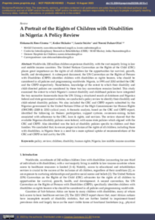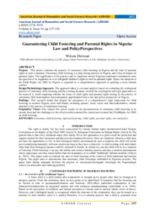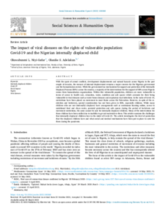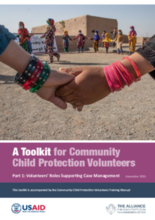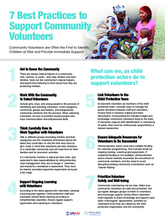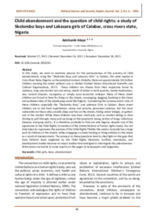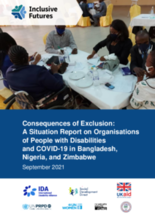childrens_living_arrangement
Displaying 21 - 30 of 136
This study examined the extent to which Nigeria’s current disability and childhood policies have integrated the CRC and the CRPD frameworks. Using a structured search of databases and Nigerian federal and state government websites, we conducted a policy review to identify their disability and child-related disability policies.
The girl hawking sachet water ran in pursuit of the bus, laying curses at the bus conductor, who had stretched out his hands and touched her breast before stealing one sachet from the plastic on her head.
This study examined the socioeconomic and demographic drivers of willingness to foster non-kin children among mothers in Nigeria. The findings of this study provide implications for research, social work practice, and education in Nigeria and Africa.
This article examines the practice of customary child fostering in Nigeria and the state of parental rights in such a situation. The significance of the practice and its impact in mostly Nigerian traditional communities raises the question of its regulation in order to safeguard children's rights as well as parental rights.
This article examines the challenges that internally displaced children face in the midst of COVID-19. The article investigates the level of protection that the displaced children have and what social and medical mechanisms have been put in place to cater for them during the pandemic.
The Toolkit for Community Child Protection Volunteers and supplementary training manual aim to promote evidence-informed best practices when engaging community volunteers in child protection responses. This toolkit is based on the Community Engagement in Case Management study, which was commissioned by the Alliance and completed in 2020.
A poster for Child Protection teams to emphasize the evidence based practices of engaging volunteers that were documented in the research.
This study examined the reasons for the pervasiveness of the practice of child abandonment, using the “Skolombo Boys and Lakasara Girls’’ in Calabar, the state capital of Cross River State, Nigeria, as the analytical context.
In Nigeria, the 2021 integrated SIAs is being implemented with a focus to improve vaccination opportunities to areas with high population of Zero dose children (who never received any vaccination) and those who missed opportunities to be vaccinated previously.
The COVID-19 pandemic has exacerbated inequalities and barriers to
social inclusion for people with disabilities. These experiences of social
exclusion have been felt to an even greater extent by women with disabilities
and under-represented groups of people with disabilities, leading to a range of
effects on the operations and priorities of OPDs. To address a critical gap in the
evidence base, the Disability Inclusion Helpdesk carried out a rapid assessment
of the role of OPDs during the pandemic, and how the pandemic has affected
OPDs’ operations and priorities.

